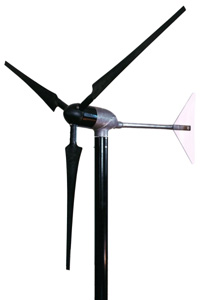Introduction to THE energy problem
With 6 billion people demanding ever more energy to live their lives, everybody will sooner or later face problems with their energy supply. Our ’traditional’ energy sources have a number of problems associated with them. They are finite in size. Also, they cause serious problems with our natural environment. And last but not least, political tensions are very high since these sources are distributed unevenly over the earth, yet we all want access to them.
Oil and gas are running out
One of the closest kept secrets in the oil industry is the knowledge of when the oil wells will run out. It has not yet informed many other people about their knowledge, and when oil executives are asked, they always talk about periods of “50 years or so”.
It has been well documented that the rate at which new oil is found peaked around 1999. Dr. M King Hubbert predicted this scenario already in 1974. This means that even though we will still find new oil, the rate at which we find will decrease. Given that our consumption will increase (China’s recent increase in oil imports is a big factor), this means that at some point in time the price of oil products will go up. Over the period 2001-2005 an increase of around 40% was observed. This is not likely to abate, and a reverse is out of the question.
Serious environmental problems
We pay a huge price for our addiction to oil. Crude oil is a nasty substance that must be refined to extract the energy stored in it. From the moment the oil is pumped out of the ground to the emissions from the petrol-driven car, oil brings pollution and destruction to this world. Accidents with oil tankers kill our seas and beaches (The Exxon Valdez disaster, for example). Children are born with deficiencies because of car emissions.
A phenomenon attributed to the usage of oil and other fossil fuels is the warming up of the global atmosphere, the so-called grenhouse effect. Although the result of burning hydrocarbons over decades, it is only lately that we have begun to understand the symptoms and what they mean for our environment.
Political problems created by our oil crave
The current woes in the Middle East are a direct result of our appetite for oil. Our western societies are based on the consumption of fossil fuels that are largely won in this region. Why this is a tenuous situation can be explained by these points:
- Our reliance on oil has made us dependent on a region that is our historical counter-pole. Tensions and conflict are running rife as result of this. The muslim world and the western world do not share many beliefs and principles. That is not to say that we must be enemies. However, our dependence on the Middle East is the reason that the region is a lackey of the west. The current situation is very frustrating for the people of the Middle-East and this results in a growing resentment against us.
- We support corrupt regimes that do nothing for their people in return for one thing – our guaranteed and uninterrupted access to their oil. Sometimes this results in serious anger, like the overthrow of the Shah in Iran in 1979. Also, Al Quaeda and Osama Bin Laden tap into this reservoir of resentment. Unless these people think they have their dignity and self esteem back, then this problem won’t go away and it will grow worse and worse. 9/11 2001 was a direct result of this.
- The instable situation sometimes calls for direct military interventions. The Iran-Iraq war of the 1980s, the first Gulf war to liberate Kuwait and the second Gulf war were all interventions to guarantee a stable supply of oil from the region.
Alternatives for oil
We can rid ourselves of oil if we devote our energy and intellect to a massive transition to other energy sources.
Solar Energy
Solar energy provides an great alternative to oil. The sun radiates enormous amounts of energy and on earth we receive much more than we’ll ever need. For more information, go to this site.
Wind Energy
Wind energy is a direct offspring of solar energy – the heat of the sun provides for temperature differences which cause winds. The wind is an unlimited and clean energy carrier. In certain regions, where solar energy is not a very rich source due to climatic reasons, wind is an excellent alternative.

Opponents of small wind turbines always point out that they are not economical in comparison to the large turbines. One point that is always forgotten in that comparison is that small turbines do not need the huge and costly electricity grid. Not building or maintaining such a network will save a lot of money and this will benefit the users of small turbines. The large turbines cannot function without such a network and as such need the huge investments for a large electricity network.
